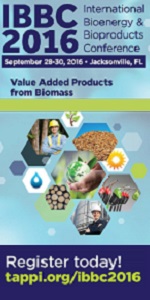 |
||||||||
| August 31, 2016 | ||||||||
| Rick's Tips - Calender Nip Impressions |  |
|||||||
|
· Subscribe to Ahead of the Curve · Newsletters · Ahead of the Curve archived issues · Contact the Editor
|
Bioenergy Technologies Office Allocates US$1 Million for Round 2 of the DOE’s Small Business Vouchers Pilot The U.S. Department of Energy (DOE) Small Business Vouchers (SBV) Pilot, which is part of DOE’s Office of Energy Efficiency and Renewable Energy’s (EERE’s) National Laboratory Impact Initiative, in collaboration with national laboratories, supports small businesses to advance energy technology and help transform our biomass resources into commercially successful, high-performance biofuels, bioproducts, and biopower. To date, EERE’s Bioenergy Technologies Office (BETO) has provided a total of US$1.6 million through two rounds of SBV awards. Round 1 occurred earlier in 2016, and Round 2 vouchers have just been awarded. In the most recent round, DOE is providing US$1 million in vouchers to assist five companies. DOE selected five national laboratories to administer the SBV Pilot, including: Lawrence Berkeley National Laboratory ( LBNL), the National Renewable Energy Laboratory (NREL), Argonne National Laboratory (ANL), Los Alamos National Laboratory (LANL), and Sandia National Laboratories (SNL). The five companies receiving Round 2 SBVs include: Avatar Sustainable Technologies, Syracuse, NY (partnership with NREL): Avatar uses paper mill waste (fiber rejects) to produce fermentable sugars. The company will evaluate the performance of NREL’s advanced enzyme, “CelA” (cellulase from the bacterium Caldicellulosiruptor bescii), to improve performance of industrial-grade sugars, and NREL will help Avatar develop a value proposition for paper mills while simultaneously processing significant waste (200 tons/day of paper mill waste) that is landfilled. Discover Value-Added Products from Biomass at IBBCTAPPI’s International Bioenergy and Bioproducts Conference (IBBC) brings together experts from around the world that are interested in leveraging the knowledge and assets in the pulp and paper industry to produce fuel, energy, and chemicals from biomass. The conference will be held September 28-30 in Jacksonville, FL. IBBC’s highly-focused program includes technical presentations, expert panels, case studies, and reports from projects that offer attendees a deeper analysis of technology and economics in commercializing biofineries. A keynote presentation from Niklas Von Weymarn, vice president, research for Metsä Fibre, will explore Metsä Fibre’s decision to replace its oldest pulp mill in Äänekoski, Finland with a new, “next-generation” bioproduct mill. Other program highlights include interactive panel discussions and a student poster session competition. IBBC is co-located with TAPPI’s PEERS Conference and the International Mechanical Pulping Conference (IMPC), giving attendees an opportunity to attend more than one conference in the same location. Registration is now open for IBBC and co-located events; TAPPI members receive a discounted rate. To learn more, visit tappi-ibbc.org. ZymoChem, Berkeley and Emeryville, CA (partnership with LBNL): ZymoChem is engineering microbes to eliminate carbon loss during the production of chemicals, such as adipic acid, from renewable feedstocks by designing completely new biosynthetic pathways. ZymoChem will work with the LBNL Advanced Biofuels Process Demonstration Unit (ABPDU) to validate E. coli’s capability to tolerate high product concentrations during fermentation and demonstrate the ability to recover purified products for customers to evaluate. HelioBioSys, Woodside, CA (partnerships with LBNL and SNL): In order to validate cyanobacteria as a renewable source of sugar for biofuel production, HelioBioSys needs to evaluate growth on a larger scale in outdoor conditions to obtain monomeric sugar types and yields, fermentation suitability, and by-product opportunities. Data generated from this study at the LBNL ABPDU and SNL’s indoor algal testbed facility will improve their existing techno-economic model and improve HelioBioSys’ ability to secure funding for a pilot test facility. Virent, Madison, WI (partnership with ANL): Catalyst deactivation shortens catalyst life, decreases yield and selectivity, and increases processing costs. Virent will work with the Advanced Photon Source, a unique user facility with special equipment at ANL, to understand the deactivation mechanisms of their catalysts. This can help Virent design better catalysts to improve the performance and economics of their technology, which produces renewable, direct replacement chemicals and fuels that meet the growing demand for sustainable, high-performance products. Mango Materials, Albany, CA (partnerships with LBNL and LANL): Mango Materials has a biogas fermentation process to produce sustainable and biodegradable biopolymers. The company is seeking to improve its ability to cost-effectively separate and de-water polyhydroxyalkanoates (PHA) from the fermentation broth and non-PHA cell mass. The goal is to further develop a cost-effective separation process for intracellular products with a path forward to scale-up at the LBNL ABPDU. BETO is accelerating the development of a sustainable, cost-competitive advanced biofuel industry that can strengthen U.S. energy security, environmental quality, and economic vitality, through research, development, and demonstration projects in partnership with industry, academia, and national laboratory partners.
Now that you are Ahead of the Curve, stay there by joining TAPPI.
For a modest investment of $174, receive more than US$ 1000 in benefits in return. |
|||||||
 |
||||||||
